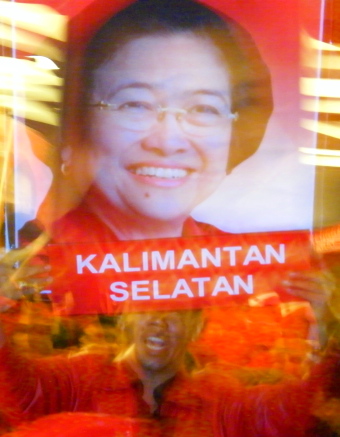Edward Aspinall
There was much singing and dancing as delegates waitedfor MegawatiEdward Aspinall |
Megawati Soekarnoputri gave a bravura performance at the opening of her party's congress in Bali on 6 April. Speaking to an audience of almost 2000 delegates from the PDI-P (Indonesian Democracy Party of Struggle), she proclaimed that Indonesian democracy was becoming something enjoyed by 'only the haves', with the majority reduced to being merely an 'audience'. Liberal democracy, she declared, could never be a 'red carpet' that would bring social justice. It was time to reclaim the PDI-P's heritage as an ideological party, its commitment to the wong cilik, or 'little people', and to reassert 'the primacy of the collective'.
At times, Megawati broke into sobs, as when she recalled exhortations her father, Indonesia's great nationalist leader and first president, Sukarno, had given more than 40 years ago to keep struggling for the people. At other times she thundered, as when she proclaimed that PDI-P would always remain alongside the wong cilik, sharing their 'joys and their sorrows', or when she condemned contemporary party politics as being merely a 'vehicle of rapid transportation toward individual economic benefit'.
Speaking from a teleprompter for the first time in her career, it was a well-rehearsed, effortless, powerful and moving performance - a departure from the stilted and remote style which many people remember from her years as president. Congress delegates were, unsurprisingly, ecstatic. But most of the national press also praised the speech, pointing to a return to the old Megawati of the late Suharto years. Certainly in my own experience of observing Megawati, it was by far her most dramatic speech, her most forceful attempt to articulate a populist critique of Indonesia's new political and social order and her clearest attempt to position her party as a leading opposition force.
Populism revived
Megawati is seeking to recapture the élan both she and her party developed in the 1990s. Heir to the tradition of Sukarnoist nationalism and rhetorical commitment to the wong cilik, at that time Megawati came to represent for many Indonesians the pre-eminent leader of opposition to the Suharto regime. Stubbornly defying government attempts in 1993 to prevent her from taking over the party leadership, and then rejecting a crudely engineered attempt to oust her in 1996, she became a symbol of quiet dignity in the face of the corruption and manipulations of Suharto's New Order.
In a wave of populist enthusiasm, PDI-P won the largest vote in the first post-Suharto elections in 1999 and Megawati narrowly missed out on becoming the first post-Suharto president that year. Since that time, however, the party's share of the vote in national elections has dwindled from 34 per cent in 1999, to 19 per cent in 2004 and 14 per cent in 2009. Ironically, it was partly Megawati's performance in government between 2001 and 2004 that was responsible, with the rigidity that had helped her to resist regime pressures in the 1990s looking like aloofness, inflexibility and indifference when she was in power. At the same time, the PDI-P has been a victim of what Megawati in her Bali speech called an 'anti-politics' and 'anti-party' mood brought about by a situation in which 'parties are no longer tools of ideology but tools for economic accumulation'.
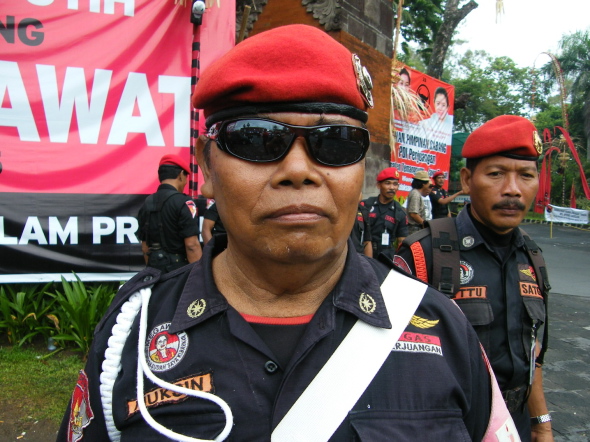 |
Party security guards are photogenic, but most delegates looked strikingly ordinaryEdward Aspinall |
In the years since the collapse of the Suharto regime in 1998, a new conventional wisdom has arisen about Indonesian party politics. According to this view, all of Indonesia's parties are more or less indistinguishable. Vehicles of a venal elite, they serve not to represent the interests of ordinary citizens but to provide access to government power and the economic resources this provides. Patronage, not policy, is the glue that holds parties together. And certainly there are good reasons to view the PDI-P through this lens. During Megawati's presidency, her party and government took many steps to accommodate members of the New Order elite. The party endorsed former military men and Suharto-era bureaucrats for key government posts. Especially galling for many of her supporters was Megawati's endorsement of Sutiyoso for a second term as governor of Jakarta in 2002, because he was the man who, as Jakarta military commander, had been in charge of a bloody operation to force her supporters out of their party's office in July 1996.
At the same time a layer of former generals and Golkar politicians made their way into the party, hoping to ride on its coat tails to political power. One of the most memorable moments in the congress came when a party delegate from Nusa Tenggara Barat, who was giving a rather incoherent excursus on party history, was heckled by a party leader in the front row. Turning to his detractor he pointed his finger, 'you be quiet! I remember you were still in Golkar back then,' he said, to the delight of the crowd. PDI-P politicians across the country have also been deeply implicated in the corruption scandals that that have swept through the political elite. Numerous PDI-P legislators, governors, mayors and district heads have been charged with corruption offences. A recent scandal in the national parliament, in which billions of rupiah in travellers cheques were shared out to smooth the appointment of Miranda Goeltom to the deputy governorship of Bank Indonesia, has implicated several prominent PDI-P legislators.
Yet, attending the PDI-P congress, it was immediately evident that there is much more to this party than elite interests. Indonesian political parties are not all alike. The PDI-P is at core an archetypal populist party, with a typically populist social base that was very much on display in Bali. In their physical appearance and personal style, the delegates looked like what they are: a cross section of remarkably ordinary, and mostly lower middle-class, small town and provincial Indonesians. Local party powerbrokers were in evidence, but most were small time entrepreneurs and provincial politicians, not big business types or big city sophisticates.
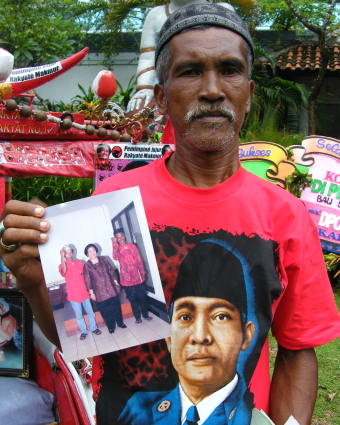 |
This man rode his becak all the way from Surabaya, a week's journey,to show his support for MegawatiEdward Aspinall |
At its core, the congress was a boisterous and hugely entertaining affair. Far from being a demure event, it was full of cheering and jeering, good-natured heckling, excited and sometimes angry declamations and frequent hilarious interjections. Many delegates were far from coherent when making their points or read from prepared statements in halting style and with poor pronunciation (invariably an occasion for more hilarity). In the evening, delegates danced to dangdut music and during breaks between sessions everyone sang along to rousing nationalist anthems and sentimental favourites from the regions. In short, this was not a gathering of a slick metropolitan elite but a festival of lower middle-class culture.
The characteristic feature of populism is an outlook of sympathy for the common person that is expressed not by way of a detailed program, but as a vague mood and rhetorical posture, and embodied in a single leader. The PDI-P in this sense is a classically populist party, but there were attempts, too, at the congress to distil its populist ideas into a program stressing such things as a 'people's economy', guaranteed minimum government allocations for public spending, improved services for the poor and so on. Some party activists are trying to inject an element of leftist politics. Budiman Sudjatmiko, a former student activist and onetime leader of the radical (but small) People's Democratic Party, for example, speaks of boosting government spending at the village level and promoting agrarian reform. Many delegates, in private discussions, point to successful PDI-P local government heads such as Idham Sadawi, the head of Bantul district, or Joko Widoyo, the mayor of Solo, who have introduced policies improving health, education and other services for poorer citizens (even if nobody attempts to generalise from these efforts to describe a coherent and distinctive PDI-P approach to local government).
All this is not to say that the party is not dominated by an elite. Among all the red T-shirts and cheap party regalia was a fair sprinkling of business shirts and big gold rings. Some of the large number of PDI-P governors and district heads also present were impressively professional when chairing sessions and discussing programmatic matters, but there were subtle signs too of patronage politics. Following the news that one party member had died on the return journey from Bali to Yogyakarta, the collection of monetary contributions for the bereaved family turned into a virtual bidding war with branch chairs outdoing themselves to make bigger and bigger contributions, simultaneously demonstrating both their populist sympathies and their financial generosity to all in attendance.
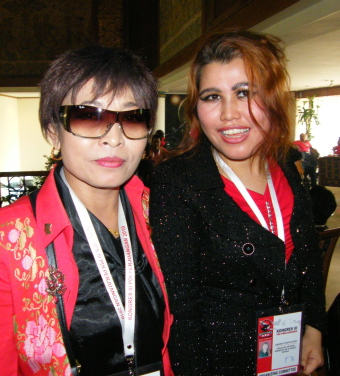 |
A sprinkling of artists added a touch of glamour to the eventEdward Aspinall |
Nobody embodies this fusion of elitism and populism as does Megawati herself. Seen by her followers, in quasi-mystical terms as the embodiment of the spirit and suffering of the wong cilik, she remains in many ways a political princess, presiding with patient benevolence over her unruly followers. The promotional video prepared for congress delegates interspersed shots of her practicing flower arrangement in elegant surroundings with recordings of her father giving rousing nationalist speeches. In unscripted moments she lectured her followers in the manner of a long-suffering school teacher.
The party of opposition
Although Megawati's re-election as party leader was never in doubt, this was not a congress without controversy. On the contrary, it began in an atmosphere of tension with the main axis of conflict concerning whether the party should remain in opposition or join President Susilo Bambang Yudhoyono's ruling grand coalition. The prevalence of 'rainbow coalition' governments in the post-Suharto era has been one factor that analysts point to when arguing that Indonesian politics is dominated by a self-serving and basically homogeneous elite. The fact that most major parties have participated in every post-Suharto government, so the argument goes, proves that the driver of Indonesian politics is the desire to access government patronage resources rather than competition over policy or ideology.
But since 2004 PDI-P has stood against this tide, at least at the national level. Arguably largely because Megawati was personally chagrined by her loss to a man who had previously served under her as minister, she has been adamantly opposed to PDI-P leaders taking cabinet posts. Yet since late 2009, after Megawati again unsuccessfully ran against Yudhoyono, Megawati's husband, Taufik Kiemas, has led a group in the party arguing in favour of joining the government. Always the pragmatist, Taufik repeatedly pressed in public for such participation even after it became obvious that Megawati opposed the plan. The messages that Taufik and his supporters sent were coded, but clear. As those working the congress floor to lobby in favour of coalition explained to delegates: 'If we are in opposition, we get nothing.'
This position was roundly rejected by congress delegates, many of whom came to the congress site wearing T-shirts or vests emblazoned with the word 'oposisi'. During the presentation of branch reports early on, province after province declared against joining the government, invariably sparking enthusiastic cheers. This groundswell not only carried the congress, it also produced a formulation that went beyond the one Megawati herself had used. In her opening speech, Megawati said that 'as an ideological party' the position of the PDI-P was that it 'will never be a part of power which does not side with the wong cilik'. But the phrase she used was that the party should be a 'force of control and balance', not opposition. Alluding to Sukarno's condemnation of opposition as a liberal concept inappropriate for Indonesia, she explained that 'the discourse on opposition or coalition has no foundation' in Indonesia.
During the congress, Taufik Kiemas and his allies used Megawati's choice of words to try to avoid committing the party to opposition. Yet on the congress floor, when it came to discussing the draft political statement, many delegates said that Megawati's formulation was too vague (though they never criticised Megawati herself). Advocating 'control and balance' alone, many said, would leave open the possibility that unscrupulous party leaders would later move the party into government against the will of its members. These voices carried the day and the party eventually adopted a statement that explicitly committed the party to opposition.
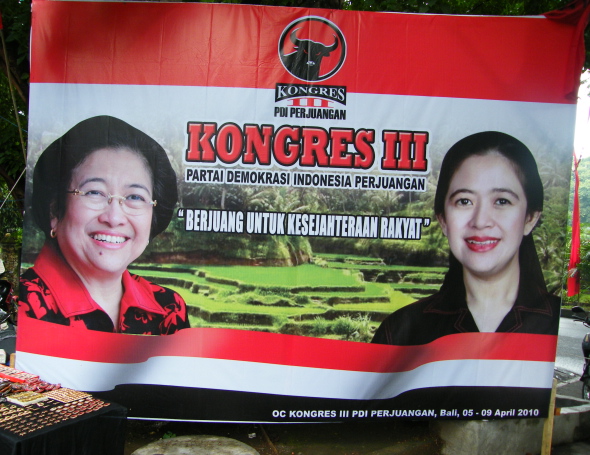 |
The jury is still out on whether Puan can inherit her mother's charismaEdward Aspinall |
This outcome points to a degree of openness in the party's internal workings that is greater than outsiders sometimes credit. Draft texts offered for consideration by party leaders were rarely approved unamended, but instead were subject to real and sometimes contentious debate. Determined delegates could shape congress decisions. For example, Papuan delegates, prominent throughout the congress, succeeded in having the party endorse establishment of a Truth and Reconciliation Commission in Papua, push for the repeal of national laws impeding special autonomy there and advance recognition of the 'Melanesian race' as an integral part of the Indonesian nation. Delegates also pushed through a suggestion that candidates for district government positions henceforth need be endorsed only by provincial executives, rather than by the central leadership board, potentially overturning a practice that has caused much dissension in regional branches.
It is a limited openness, to be sure. Over the years, leaders who have fallen out with Megawati have been excluded from the party, which now consists basically of Megawati loyalists. In Bali, her journey back to the party chair was a one horse race. Just five out of almost 500 districts endorsed the only other would-be candidate, Megawati's younger brother, Guruh Soekarnoputra, who is not a significant figure in the party. Guruh wasn't even admitted to the congress venue and was reduced to running a clownish sideshow in a nearby hotel. After her re-election-cum-coronation, delegates gave Megawati unfettered authority to determine who would sit on the new central leadership board (unlike in most other parties where a team performs this task). It is also telling that the main factional conflict recently in the party has been between Megawati loyalists and supporters of her husband, indicating the degree to which party leadership has become a family affair.
Toward a dynastic succession
Arguably, the most serious problem the PDI-P faces is succession. Megawati took over the leadership of the PDI, the party's predecessor, almost 17 years ago. She is now 63 years old, dramatically and tearfully alluding to her own mortality in her closing speech. Among delegates there was an underlying current of anxiety about who will replace her when the time comes. Almost everyone agrees that whoever does succeed, it must be a member of the Sukarno family. Not only does the family embody the hopes and aspirations of the wong cilik, many delegates explained to me, without someone from the Sukarno family as successor, the party would fracture.
In the lead up to the congress, there was open discussion in the party about facilitating transition by establishing a new post of deputy general chairperson, whose occupant could be groomed to take over from Megawati. It was universally understood that Megawati's daughter, Puan Maharani, who has been a member of the party's central board since 2007 and of parliament since 2009, was the leading candidate for such a post. It was equally well known that Taufik Kiemas was the author of this plan and that his push for participation in government was also partly aimed at securing a cabinet seat for his daughter, so helping her improve her authority for eventual party leadership succession.
But the proposal failed. When a few branch delegates proposed a deputy chair post, others angrily shouted them down. The majority saw the idea as an affront to Megawati that would undermine her authority and produce leadership dualism. Most also viewed it as a back door through which Taufik Kiemas and others who favoured joining the government coalition could exercise influence. In fact, most Indonesian parties have deputy general chairpersons but the power of the Megawati myth meant this modest proposal went nowhere.
Indeed, as the congress began, the word among delegates was that Megawati was against the plan because she wanted to give an equal chance to all younger members of the Sukarno family. At a press conference on the eve of the congress, Megawati, Taufik and Puan were joined by Megawati's son (by an earlier marriage), Prananda Prabowo, and by Puti Guntur Soekarno (Megawati's niece). Although this display of young Sukarno flesh aroused much excitement in the press and among delegates, Prananda and Puti were not prominent in the congress proper, unlike Puan who was head of the organising committee. When the congress ended, Puan was the only one included in the new central leadership board and was promoted from the social and women's empowerment portfolio to politics and inter-institutional relations. This post, added to her position as joint leader of the party's parliamentary caucus, puts her in the pole position for succession.
Yet Puan is a problematic successor. She inherits all of her mother's regal style, without the history of personal sacrifice that makes it resonate for ordinary party members. At the congress she made two speeches: in one she stumbled over her words, in another she made an awkward attempt to identify with the party's history of suffering. Recalling the black days of the late New Order, the most she could muster by way of personal anecdote was a recollection of visiting Bali with her mother and the poor accommodation they had to put up with at the house of a party loyalist, whose name she forgot. I used to ask 'Mother, why is it that we can't stay in good hotels like other families?' she recalled. Such comments, and much of her personal behaviour, emphasise Puan's elite status rather than impressing upon party members her empathy for the common people. One congress delegate from Sumatra explained his scepticism thus: 'I doubt that she's walked on her own feet for more than ten kilometres in her whole life.'
This is not to say that there is suspicion of Puan, let alone active hostility toward her, in party ranks. But experiencing a PDI-P congress leaves one in no doubt that this is basically a fractious and contentious party even if it is, for now, welded into a unit by Megawati's personal authority. When Megawati passes from the scene, engineering a dynastic succession may not be as simple as many commentators assume.
Where to now?
So what might the future hold for Megawati and the PDI-P? Party leaders and members alike hope that the party will become a beacon of opposition and harness the deep currents of populism that continue to flow through Indonesian society, putting it in a position to dramatically increase its vote in 2014. Some delegates spoke optimistically of tripling the party vote (a feat achieved by Yudhoyono's Democratic Party in 2009) and being once again in a position to contest the presidency.
But this was, after all, a congress for the true believers. Though they could whip themselves into a frenzy of enthusiasm whenever Megawati addressed them, behind the scenes many delegates were disconsolate. Almost everywhere the stories were the same: of declining votes, endorsed candidates for local government office forgetting the party once in power and waning public support. Many remembered nostalgically an earlier congress of Megawati's party in Bali in 1998, which had taken place amidst local crowds and a wave of popular enthusiasm. This year, most Balinese appeared indifferent to the congress in their midst and the banners that lined the streets had mostly been erected by congress organisers or regional party powerbrokers who hoped to curry favour with Megawati.
When all is said and done, the fate of the party rests where it always has: in the hands of its leader. At the end of the conference, Megawati gave every impression of being deeply satisfied with her own performance. At one point she proudly told delegates that her speech had been viewed as 'very good' by the media, and that it was now up to the party members to work on its implementation. Yet the new central leadership board Megawati announced at the close of the congress did not justify the high hopes for party regeneration that had been aroused earlier. Although it included some younger members, it also featured several established powerbrokers with dubious reputations for probity and energetic young party leaders like Ganjar Pranowo, Budiman Sudjatmiko and Eva Sundari were left out.
Moreover, becoming an effective opposition requires not only an effective party machine but also a leader who is constantly in the public eye, challenging and confronting the government on every policy and political issue. In the past, Megawati has proven unwilling or unable to play this role. It is also far from clear that she will be willing to run for what might be a third unsuccessful tilt at the presidency, or that any successor will have time to emerge from her shadow with enough public profile or credibility to contest the post. Her rigidity and unwillingness to compromise, which excites party loyalists and helps to keep the party united, is well suited to opposition. But in the past it has alienated many ordinary voters. And although Megawati admitted in her speech that the drop in the PDI-P vote in 2009 was a 'rebuke', party insiders say there is one thing that she will never discuss: the possibility that it might be her own performance that is partly to blame. By the end of the congress, the party was left with the paradox that has haunted the party now for almost two decades: Megawati herself is simultaneously the greatest strength of her party and its greatest weakness.
Edward Aspinall (edward.aspinall@anu.edu.au) is a senior fellow in the Department of Political and Social Change, Australian National University. He wishes to thank the PDI-P for generously providing access to all sessions of its congress, and Marcus Mietzner for arranging access and for his input.
